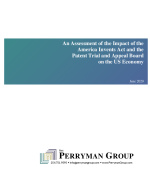An Assessment of the Impact of the American Invents Act and Patent Trial and Appeal Board on the US Economy
Published on June 25, 2020

Innovation has long been recognized as the key factor supporting US economic growth and competitiveness. A critical element of the infrastructure facilitating product development and commercialization is the system that protects intellectual property and encourages its widespread adoption and implementation. The current framework that facilitates this process includes the Leahy-Smith America Invents Act (AIA) and the Patent Trial and Appeal Board (PTAB). The AIA and PTAB reduce the need for and cost of patent litigation, reducing transaction costs and generating many substantial economic benefits.
The Perryman Group estimates that over the 2014-19 period, cost savings associated with AIA/PTAB led to an increase in US business activity of $2.95 billion in gross product, $1.41 billion in personal income, and nearly 13,500 job-years of employment (including multiplier effects). With about 10,085 AIA/PTAB trials over the 2014-19 period, the estimated economic benefit averaged over $292,900 per case in US gross product and $139,985 in personal income. The industry group experiencing the largest gains was manufacturing, with an estimated increase of $1.41 billion in gross product and almost 5,100 job-years of employment (including multiplier effects).
Economic performance in the United States over the long term is critically tied to the rate of innovation. The AIA and PTAB enhance the efficiency of the innovation process, thus fostering future prosperity.
For more details please refer to the full report.